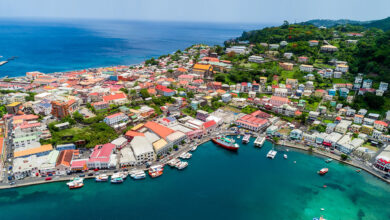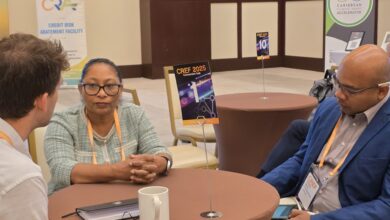I wish to begin by conveying greetings on behalf of the Secretary-General of the Caribbean Community, Ambassador Irwin LaRocque. He sends his highest regards and commendation to the Government of the Republic of Trinidad and Tobago for the initiative to host the Launch of CARICOM Energy Week 2013.
Indeed, it is rather appropriate and timely for CARICOM Energy Week 2013 to be launched in Trinidad and Tobago at a time when Prime Minister, the Honourable Kamla Persad-Bissessar, who has responsibility for Energy in the CARICOM Quasi Cabinet, is the Chair of the Community. This CARICOM Energy Week Launch, may also be seen as a fitting climax to an eventful year in the energy capital of CARICOM which included the historic event of the approval by CARICOM Energy Ministers of the CARICOM Energy Policy, and the establishment of Regional targets for renewable energy.
This year marks the third staging of the CARICOM Energy Week, which is being celebrated under the theme `A Secure and Sustainable Energy Future begins Now: Reflect and Re-set for clean & green energy, energy efficiency and energy diversification’. CARICOM Energy Week was established as an annual event by CARICOM Energy Ministers, and is observed as concurrent national energy weeks – aimed at assisting awareness building towards informed choices and actions, which would result in the formulation of policies to establish a regional energy sector which is cleaner, greener and more efficient.
One could ask, what is the real value of a CARICOM Energy Week celebration?
To begin with, energy is so integral to all that we do that often times we take it for granted. Yet, in so doing, we run the risk of undermining our future development. Also, it is worthwhile to note that while we often take our energy for granted, about 45% of the population of the Community does not have access to modern forms of energy.
Therefore, Energy Week provides the opportunity to reflect and have useful dialogues and engagements and build awareness on the issues towards ensuring that we make optimal decisions in relation to our energy future. In this regards, all citizenry and stakeholders at all levels must necessarily be engaged since the energy issues span the social, economic, political, technical, and also has profound environmental dimensions. CARICOM Energy Week is about increasing the awareness; it’s about creating a platform for useful dialogue and the influencing of actions at all levels towards the desired transformation.
While Energy Week is about ENERGY in general, the matter of renewable energy (RE) and energy efficiency(EE) has been given significant focus because of the critical importance of this matter for countries which are net-energy importers – – which are the majority. For these States, renewable energy and energy efficiency represent their only long-term option for extricating themselves from the clutches of the overwhelming oil-import dependency. RE and EE remain relevant for all CARICOM States if they are to fulfil the objective of establishing low carbon development. In this regard, the visionary approach of the Government of Trinidad and Tobago is commendable, in that despite Trinidad and Tobago’s vast hydrocarbon resources, the Government has seen it necessary to advance many policy positions and actions towards encouraging greater use of renewable energy and improving energy efficiency.
In most CARICOM Member States, a small shift in demand based on increase in energy efficiency can yield saving of millions of dollars in the oil import bill.
CARICOM’s oil import bill is approximately 10-15% of the total regional GDP (of US$65-70 Billion); this is not sustainable economically. In the case of Trinidad and Tobago — being a major producer and net exporter – any reduction means greater opportunity for export and also local consumption.
Further, CARICOM Energy Week represents an important symbol for collaboration and cooperation around a very important aspect of life of the Community. It provides a platform for serious engagements on the various issues and can even facilitate on-going engagements on the often difficult and contentious aspects. We consider that the establishment of CARICOM Energy Week has therefore served to support and strengthen the integration efforts.
In passing, it is noted that in 2012 the UN General Assembly declared the period 2014 to 2024 the Decade of Sustainable Energy For All towards raising global consciousness and mobilizing resource to address the energy poverty. In the years to ahead, it is contemplated that the CARICOM Energy Week initiative will serve as one of the links between CARICOM and the International Community’s awareness-building thrust for sustainable energy development.
As most of you would be aware, the CARICOM Heads of Government are currently grappling with the issues of stimulating economic growth in Member States and the Community as a whole, as well as the matter of how to address the challenge of the size of the external debt-burden for many Member States. These situations are further compounded by the prospects of diminishing development aid support to most CARICOM Member States, owing to their being categorized (‘graduated’) as middle income.
It can be easily seen that the issues (i.e. economic growth and the external debt) are intricately linked to the countries’ energy situation in the following ways:
– Firstly, for most Member States, energy forms a critical binding constraint to economic growth and competitiveness — given its pervasive nature, as a critical input to the productive sector; and
– secondly, the cost of energy imports represents a drag on the national budgets, and serves to aggravate the external debt situation for many CARICOM countries. This is more acute in cases where government subsidies exist as a means of ameliorating the impact of energy cost for the population.
Therefore, strategies for addressing economic growth and the external debt, over the long-term will necessarily require that the issue of the high cost of energy in the various territories, be addressed in parallel.
– On the other hand, pursuing the development of clean energy (including natural gas) and renewable energy options can provide solutions to the challenge of high energy cost, through fuel substitution, which provides lower and more stable costs substitution. Energy efficiency improvements can go a far way towards the decoupling of economic growth from increased energy demand. In addition, a Community’s strategy of pursuing the development of its clean energy and renewable energy options along with the development of its energy efficiency strategy will provide some opportunities for responding to the impact of ‘graduation’. This is so because, given the nexus between the energy sector and climate change problem, there are opportunities for accessing developmental resources/financing under the Climate Change and green financing umbrella.
Therefore, there seems to be an opportunity for Community level approaches and strategies to be advanced toward effectively accessing the available resources.
As I have observed elsewhere, notwithstanding the critical importance of the trade-in-energy dimension of our Community arrangements, the areas of sustainable energy and clean energy developments provide a good opportunity for functional cooperation on energy. Given the Region’s constraints in terms of limited capacity, the geographic distribution of the territories and the energy resources, and the cluster of experience around the various resources, it is only logical that Member States seek to cooperate and collaborate in areas of capacity-building, research and development in the energy sector. In fact, this is a key focus and utility of the CARICOM Energy Policy.
However, there are challenging and sometimes thorny issues to be addressed within the various territories; and the national energy week activities being observed as part of the CARICOM Energy Week, provide opportunities for advancing focussed dialogues around some of these which include:
– The issue of reform of the electricity sector to remove monopoly over generation
– The issue of establishing fair tariffs; also restructuring of tariffs to be more cost reflective so that economic development of alternates can take place
– Regulation of the sector both for electricity and transport sectors, to address various market imperfections;
– Policies and regulations for the importation of appliances and vehicles in relation to minimum efficiency and performance standards – these need to be carefully managed given the implications for commitment under the WTO
– Issues of inter-connection of energy infrastructure (gas and electricity) which will require significantly increased cooperation – and which are critical for the economic development of the resources in some territories – but questions remain as to whether such arrangements are not simply substituting one kind of dependency for another?
– Fiscal incentives to encourage investments in EE and RE while at same time encouraging behaviour modification with respect to consumption patterns
– How to structure incentives in the context of fiscal consolidation being pursued by countries;
– How to effectively address the information gap to support decisions; there needs to be rigorous analyses to establish benefits and costs over various time horizons, so that decisions can be more evidence-based.
– What are the appropriate instruments to facility grid feed-in for renewable energy; net metering/net-billing, versus Feed-in-tariffs; Renewable energy Portfolio standards establishing what are fair price for energy supply
– Role of the utilities in transition
Through the theme of CARICOM Energy Week, there is a call for urgent action, to recognize that as individuals, citizens, businesses, and governments, our energy future will be dependent on the policies, strategies and actions that we pursue NOW. The theme is also a call to all, to exercise responsible actions for the benefit of future generations. Therefore, we must reflect and re-set, recognizing the emerging potency of the green and clean themes, and need for increased stewardship to ensure economic and environmental sustainability. As we do so, we recognize that we will need the support from our development partners who have been supporting sustainable energy development in the Region over the years. We express thanks for their support continued over the years and, in particular, the Government of Germany for support of CARICOM Energy Week activities in Member States and at the regional level.
I invite one and all: students, housewives, business persons, professionals – from all spheres, policy makers, indeed all the public sector, private sector and NGO’s, to Reflect and Re-set for clean and green energy, energy efficiency and energy diversification, recognizing that “A Secure and Sustainable Energy Future begins Now!
I thank you





